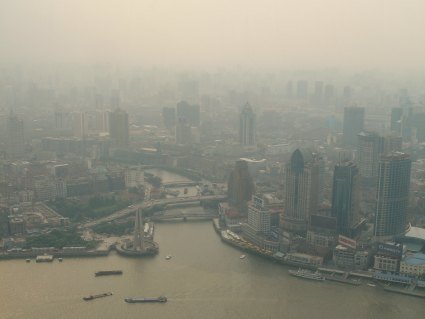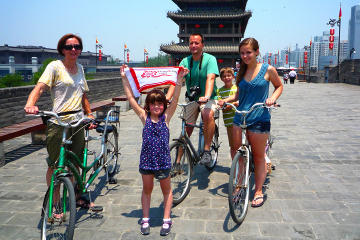
| Home | What's New | China with Kids | | Plan Your Trip | Top Destinations | China Tours | | Chinese Culture | Chinese New Year | China Facts | | Books and Resources | Site Map | Pollution in ChinaPollution in China has been a long-standing problem which is finally catching more attention due to the deteriorating circumstances in light of the fast pace of modernization undertaken in the country. Visitors not used to this high degree of contamination and unclean air are often affected. 
We noticed the heavy smoggy air as soon as we got off the plane. You will see people wearing masks when levels of pollution reach extreme levels. In urban areas, heavy traffic and increased number of cars contribute to the permanent hazy layer covering the cities. As we traveled inland the problem did not go away. The fast pace of industrialization and migration to urban areas is well beyond the heavily populated areas of the coast. Most of the energy supply comes from coal, not the cleanest of sources but the most readily available. You might experience the effects of the poor air quality in different ways:
Take special precautions if you or anyone in your group suffers from asthma, other respiratory diseases or heart concerns.
It is always best to consult your doctor before you go.
Learning More About Pollution in ChinaThe following extract is from a research paper written by Zuzana Kollarova, a high school student at QSI International School of Bratislava, Slovakia for her Geography class. As part of her research, she conducted several interviews with experts in the field and posed questions regarding the effect of pollution on Chinese everyday life and the main causes of pollution in China. Here are some extracts from her paper and research notes, including the questions posed and a summary of the answers received: 1. In your opinion, what is the biggest problem pollution is causing in China?
2. What kind of effect is this having on every day life? Do people have to change the way they live because of pollution?There are two different types of pollution: general pollution and local pollution.General pollution affects almost everyone in many ways:
3. How has the state of pollution changed over the years? What was it like when you parents were your age? Were their lives different?The situation is getting worse: The Chinese government is aware of the pollution problem; however growth is too fast for the government to make any significant changes. New factories are accelerating the pollution process and degrading air, water and land.Before China started industrializing itself, people had clean water and didnt have to worry if their food was contaminated or not. Also, many people living in cities have to wear masks to protect themselves because the pollution is so severe. 4. How well informed are Chinese citizens about the consequences of pollution? Do they teach students about it in school?Chinese seem to be aware and there are public advertisements warning people about environmental degradation. At schools, there is no evidence that teachers are educating students about the problem, but they reduce outdoor activities during air pollution peaks.So it is unclear if the citizens are well-informed about all the issues that come with polluting. 5. What are the biggest contributors to pollution in China?The pollution in China comes from various different sources:
6. Are there any new diseases in China that are related to unclean air?Cancers, pollution makes cancer the top killer in China.7. What is the government's response?Chinas priority has been economic development, even to the expense of the environment. As per public government announcements in the past, China believes that they have the right to industrialize themselves just like every other country did prior to them.Even though economic development is on the top of Chinas priority list, it is slowly working on becoming more environmentally friendly. The problem is that new factories, which are powered by coal, are being built everyday, so eliminating CO2 emissions and meeting environmental demands is going to be a hard task for China. To compound this problem, city/government officials' performance and promotions are based on economic growth only, leaving no incentive to enforce any environmental rules that address pollution, much less to take initiatives towards improving the situation. What YOU Can Do About Pollution in ChinaSomething to think about: a big part of the manufactured products in our countries come from China. Try to reduce your personal impact on the environment by making efforts to reduce waste, this will also help improve the situation in China! Tell that to your friends and teachers:
We all have an impact!
To learn more about the China pollution situation, visit www.pollution-china.com a website/blog ran by a young French entrepreneur living in Beijing. The scope of the website is to talk about pollution in a proactive way and to bring about solutions. Click here to learn more about Green Travel in China and tips to reduce our carbon footprint while traveling, to China or anywhere else in the world.
| Plan Your Trip |
| Getting There | Where to Stay in China | China Visa | Travel Insurance Options | China Vaccinations | Is a China travel tour for you? | Packing List | | General China Info |
| Plan Your Trip |
| Getting There | Where to Stay in China | China Visa | Travel Insurance Options | China Vaccinations | Packing List | | Is a China travel tour for you? | Weather in China | Chinese Holidays | Time in China | Electricity in China | Chinese Money | Drinking the Water
You are here: Home > Plan your Trip to China > China Travel with Children > Pollution in China Thank you for visiting China Family Adventure! |
Most Popular China Toursby Viator
|
|
|
|
||
|
| Site Index | About Us | Disclaimer | Privacy Policy | Contact Us | Affiliate Disclosure: Some links on this page are affiliate links. We receive a small commission when you book travel or buy products from our affiliates. This helps us with our running costs of maintaining the site and helps us sponsor children in need through SaveTheChildren.org Thank you for your support! Copyright © 2022 by M. Hoffmann www.china-family-adventure.com - All rights reserved.
|
||












Got a tip?
Got something to share? Let us know!